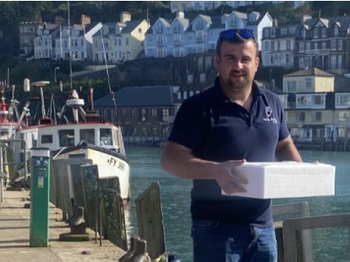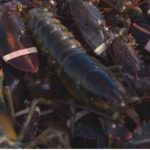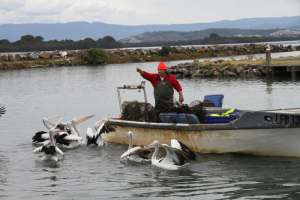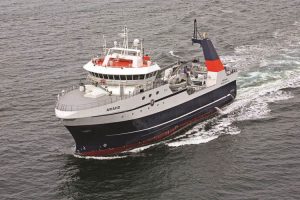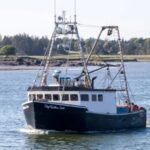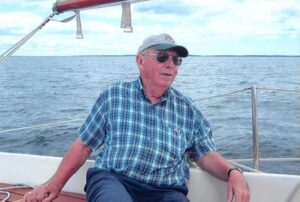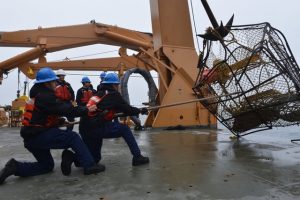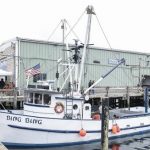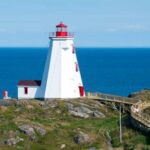Tag Archives: Coronavirus

Five B.C. First Nations say salmon decision shows systemic racism at DFO
The five Nuu-Chah-Nulth First Nations are upset that Ottawa decided to give a surplus allocation of salmon — which arose this year due to reduced recreational fishing during the COVID-19 pandemic — to commercial fishers rather than to the First Nations. Clifford Atleo, lead negotiator for one of the nations who is also called Wickaninnish, says he feels sports and commercial troll fishers are given more rights to fish in the waters off the west coast of Vancouver. He says the latest decision to shut First Nations fishers out of an opportunity to catch more chinook salmon this year shows systemic racism is “alive and well” within the federal fisheries department. >click to read< 08:52
Dear Mr. Pentony and Dr. Hare: On behalf of the MAFMC I am writing to express our deep concern about the plan to redeploy observers
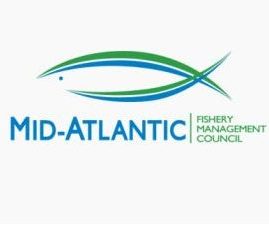 On behalf of the Mid-Atlantic Fishery Management Council, I am writing to express our deep concern about the plan to redeploy observers on vessels in the Greater Atlantic Region on August 14, 2020. Given the continued transmission of the COVID-19 virus, we do not believe the observer program can be safely operated at this time. >click to read< 14:49
On behalf of the Mid-Atlantic Fishery Management Council, I am writing to express our deep concern about the plan to redeploy observers on vessels in the Greater Atlantic Region on August 14, 2020. Given the continued transmission of the COVID-19 virus, we do not believe the observer program can be safely operated at this time. >click to read< 14:49
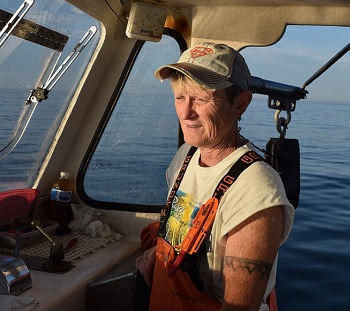
For New England lobstermen, resilience in ‘a season of uncertainty’
This is a tough season so far for Ms. Rosen, but over her 15 years of lobstering off Vinalhaven, Maine, she’s always been a better fall fisherman, she says. This season is like no other – the lobsters are slow to appear, but more than that, the coronavirus has caused trade to plummet and tourists to stay home. Rosen is selling her lobster for $3.35 per pound – a dollar less than last year – and she’s torn between wanting to catch more and worrying about flooding the market by catching too much. To supplement, she picked up a job with UPS in the afternoons after fishing. Ms. Rosen often fishes for her own bait rather than buying it.,, On Cape Cod, Glen Sveningson has been getting about $5.30 a pound wholesale, but it’s starting to fall. “Last year was one of the best years I’ve seen,” he says. >click to read< 13:17

SCRUB OBSERVERS ON FISHING TRIPS!
From all indications, on August 14, National Oceanic and Atmospheric Administration commercial fishing monitors will be back looking for a journey unless NOAA steps in and waives the requirement for data-collecting observers during the COVID-19 pandemic. The information human observers collect can be temporarily gathered through electronic surveillance, but a momentary waiver has to come directly through your two U.S. Senators and one U.S. Representative in Washington. Let them know as soon as possible because if you don’t email or call them now, don’t think anyone else is going to do this for you. >click to read< 08:11
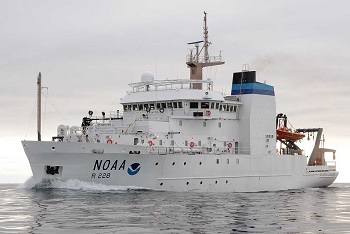
Covid-19 Transmission and Mandatory On-Board Observers
You have two Senators and one Member of Congress representing you in Washington. If you are concerned with the recent NOAA/NMFS decision to once again require their observers on board commercial fishing vessels,, you should let them know, and you should let them know ASAP, Feds the observers will be back and looking for rides on August 14, w/links,,, More on Covid-19: We know that research cruises by the R/V Bigelow have been cancelled for (at least) the rest of this year. There must be a compelling Covid-19 related reason for this, and I’d suspect for the fact that NOAA/NMFS has been making it awfully hard to get solid info on where their research vessels are or aren’t,, Captains and crew members know the people who work with them,, On the other hand, mandatory fisheries observers are about as far from necessary as one can get in this pandemic year. While they unknowingly will be putting fishermen at risk, in actuality all they will be doing will be providing government scientists with data points for them to add to data sets that in instances go back fifty years or more. By Nils Stolpe >click to read< 15:35

Jermaine Owens delivers North Fork seafood to your door, and now he has a restaurant, too
When Jermaine Owens was 12 years old, he remembers watching his father Thomas Reed, hard at work processing fresh fish at Cooper’s, a local retail fish store on Carpenter Street in Greenport. The young Owens would see the boats come in and dump their catch, and then watch as his father, a professional fish cutter, would apply his skill. In those early days, the seed of a vision was planted, one bloomed at an unlikely time — in the middle of a global pandemic. In February, Owens realized his dream of starting his own business, creating North Fork Seafood LLC, a full-service seafood company that sells fish to several commercial customers and restaurants and also offers home delivery for individuals and families. >click to read< 07:52
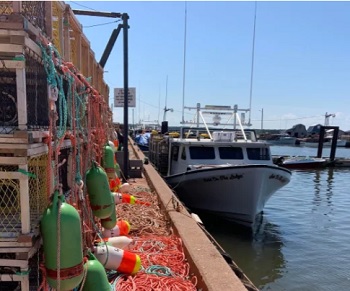
Prince Edward Island Lobster fishermen prepare for fall season after challenging spring
“I’m feeling good about the season,” said Peter Hustler, who has been fishing since he was 15. “Everybody has to make an income.” Demand for lobster plummeted as the pandemic forced restaurants to close earlier this year. The price dropped as low as $3.50 per pound. “It hurts, it hurts, and it hurt this spring, too, but I think everything is going to work out,” he said. “I’d like to see the price at $4.50 or $5 … and I believe it might happen.” >click to read< 19:09

Friendship lobster boat races refuse to let coronavirus pandemic ‘sink us’
With the theme and rallying cry of “COVID-19 Didn’t Sink Us,” 52 vessels registered, including a handful of newcomers, for 31 speedy water battles during the annual Friendship Lobster Boat Race on Sunday, July 19. While a handful of the state’s lobster boat races were not held this summer due to the pandemic, Rockland, and later Friendship, went off without a hitch. Rockland hosted its races in June and Friendship in July. Elizabeth-Ann Bartlett said for the Friendship event some trailered boats to the site and others anchored offshore. “But all came ready to race,” she said. >click to read< 14:48
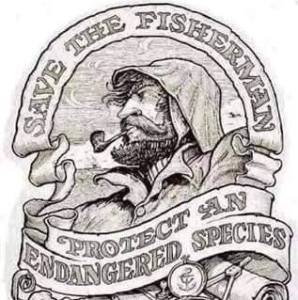
Baker Polito Administration Announces Coronavirus Disaster Relief Funding for Fishing and Seafood Industries
The Baker-Polito Administration has announced the distribution of $27.8 million in federal disaster relief funding to mitigate the financial impacts to the fishing and seafood industries from the Coronavirus COVID-19 pandemic. The Division of Marine Fisheries worked with fishing industry stakeholders to develop a plan to distribute the federal fisheries assistance, which has now been approved by the National Oceanic and Atmospheric Administration. >click to read< 11:12
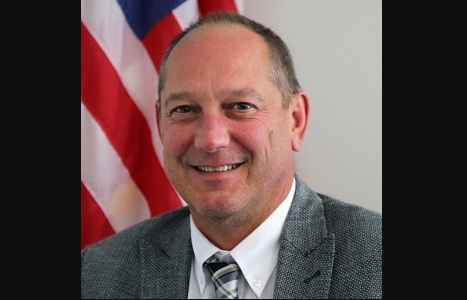
A Letter to NOAA Fisheries Assistant Administrator Chris Oliver about the resumption of Observer coverage
Mr. Oliver. Recently you sent out an announcement about the resumption of Observer coverage set to begin on August 14th in fisheries where coverage had been suspended due to the Corona virus outbreak for the last 5 months. Personally I find your reasons for the resumption of observer coverage to be not only reckless, but dangerous to the health and safety of the American fishermen who make their living from the sea.,, Yet you, in your infinite bureaucratic knowledge of what is right and what is wrong, think that at this time it is vitally important that observers be placed on fishing vessels where they can endanger the health of not only the crewmen but their families. Interestingly, you have not put your own employees at risk. You have cancelled trawl survey’s for the remainder of this year so as not to risk their exposure to this lethal disease. This despite the fact that the NOAA trawl survey vessels are state of the art, and their crew could actually be quarantined before a trip to assure their safety. I’m sure they would be happy to collect two weeks of pay for sitting around watching TV somewhere. >click to read< 15:05

‘Okay, so what do we do?’ – New Markets Reshape Crab Industry
“China shutting down was when we first started to feel the impact of the (coronavirus) pandemic, then the closures of restaurants and stores hit us full blast,” says Novotny. “All of a sudden nothing was going out.” “But necessity is the mother of invention. Everyone from the crabbers to the processors to the mom-and-pop places started saying, ‘Okay, so what do we do?’ and you started to see Pacific Seafood start shipping crab all over the country.” Until the pandemic, flash-freezing techniques, which freeze crabs in a briny block of ice to maintain flavor and texture, was a niche market, used primarily for small orders. >click to read< 10:37
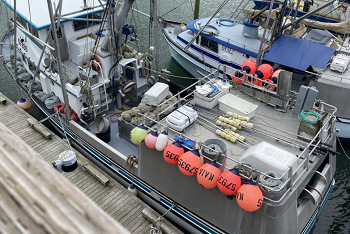
Alaska fishermen face ‘perfect storm’ of problems during Coronavirus pandemic, but state grants could help
On Friday, the Alaska Department of Commerce, Community and Economic Development announced that the COVID-19 small business grants program was being expanded. Starting Aug. 6, commercial fishermen across Alaska can apply for grants worth between $5,000 and $100,000. Before that date, fishermen were ineligible for help as they typically don’t have business licenses. Many in Alaska’s fishing industry need the assistance. Robert Venables, the executive director of Southeast Conference, said fishermen across the region had been reporting poor returns. “This year it’s been a perfect storm, the slump has continued. The catch is even worse than last year, by far,” Venables said. >click to read< 13:56
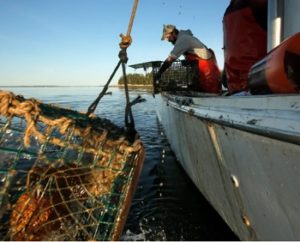
The economic fallout for plummeting demand and prices is producing the worst conditions lobster fishermen have seen in years
“The problem is really only beginning for this industry,” said Sue Clough, who, along with her husband Vincent runs Stern Seafood, a major buyer in Scarborough of lobster harvested by local fishermen.,, Dennis Violette, who has been fishing for lobster out of Scarborough for the past 40 years, said prices for lobster now are about $1.25 per pound less than at this time last year, due to the drop in demand. He and his fellow lobstermen aren’t shipping as many overseas as in previous years, and demand has dropped from processors in Canada, which are usually big customers for local fishermen like himself. If tourists stay away this fall, he said, it’s only going to get worse. >click to read< 09:02
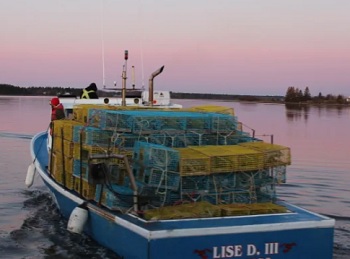
New Brunswick: Grand Manan Fishermen’s Association says financial support program may not be enough
On Wednesday the federal government announced a $469-million program to help fish harvesters deal with financial burdens amid the COVID-19 pandemic, but the Grand Manan Fishermen’s Association worries it won’t be enough. Melanie Sonnenberg told Information Morning Saint John the program leaves out new fishermen and that’s concerning. “They’re our future, and we have to have some recognition, some special programming or something that we can plug them into to make sure they’re looked after so when we come out of this we’ll have a fishing industry that is every bit as robust as it was.” The fish harvesters benefit covers 75 per cent of income losses over 25 per cent for the 2020 tax year, compared to 2018 or 2019. The maximum benefit is $10,164. >click to read< 11:22
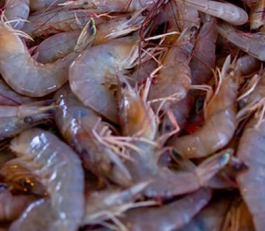
Wicker, Hyde-Smith, Palazzo Announce $30M in Aid for U.S. Shrimp Industry
The announcement comes after the Mississippi lawmakers sent a letter to USDA Secretary Sonny Perdue requesting that he use his authority to purchase and distribute Gulf seafood to those in need during the coronavirus pandemic. Recently-enacted legislation, including the Coronavirus Aid, Relief, and Economic Security (CARES) Act and the Families First Coronavirus Response Act, includes additional support for USDA programs that provide food to distressed communities. “Mississippi’s shrimp industry has been hit hard by COVID19, with many vessels having to stay tied to the dock due to collapsing markets. We are glad to hear the USDA is stepping up purchases of Gulf shrimp and applaud the hard work of our Congressional delegation to make it happen,” >click to read< 09:17
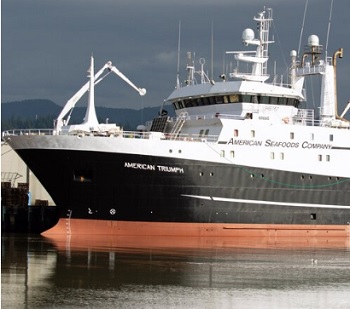
Coronavirus outbreaks keep sidelining vessels owned by one of Seattle’s largest fishing companies. No one’s entirely sure why.
It’s not surprising that fishing vessels would become potentially high-risk environments as the pandemic worsened. Like cruise ships, which became notorious Covid-19 hotspots in the early days of the outbreak, fishing trawlers tend to confine people in close quarters for prolonged periods of time. But several additional factors make fishing vessels susceptible to outbreaks: Living arrangements require people to cram into tight spaces together, sharing bunkrooms, dining areas, toilets, and other facilities. “These people are four to a room,” said Dr. Marisa D’Angeli,“They’re in bunk beds. They share a bathroom with the four people [in the] adjacent [room]—so eight people total. People don’t wear a mask when they sleep.” The work environment, which requires people to work closely together in wet, chaotic circumstances, is no less fraught with transmission opportunities. >click to read< 08:08

Coronavirus Uncertainties: NOAA Cancels Four Fisheries and Ecosystem Surveys for 2020
Due to the uncertainties created by the COVID-19 pandemic and the unique challenges those are creating for NOAA Fisheries, we are cancelling four research surveys off the East and Gulf Coast of the United States. The cancelled surveys include: Autumn Bottom Trawl Survey (NEFSC), Summer Ecosystem Monitoring Survey (NEFSC), Northern Shrimp Survey (NEFSC), Summer and Fall Plankton Survey (SEFSC). These are difficult decisions for the agency as we strive to balance our need to maintain core mission responsibilities with the realities and impacts of the current health crisis. >click to read< 18:33
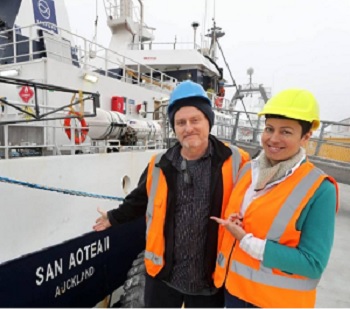
Hitchhiking honeymooners hitch a 9,200km trawler ride – Fishermen, honeymooners back in NZ after voyage from Falkland Islands
A New Zealand honeymoon couple stranded on the remote Falkland Islands in March because of the coronavirus have managed to return home by hitching a ride of more than 9,200 kilometers on an Antarctic fishing boat. Skipper Shane Cottle said he was a bit nervous at first about taking the couple on his 38-meter vessel San Aotea II, along with the crew of 14. >click to read< Fishermen, honeymooners back in NZ after voyage from Falkland Islands – Fifty-nine days after it departed Timaru on a mission to retrieve stranded fishermen from the Falkland Islands, the San Aotea II returned to the port on Tuesday morning – its passengers and crew ecstatic to finally be home. >click to read, and timeline of events< 14:52
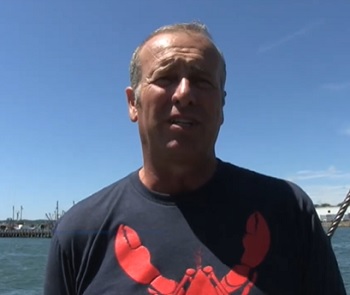
Second coronavirus wave would be ‘catastrophic,’ Massachusetts fishermen say
Commercial fishermen and lobstermen in Massachusetts already “crippled” by the coronavirus pandemic say they fear a second wave in the fall would sink the industry. “If there’s a shutdown then, it could be catastrophic,” said Joey Ciaramitaro, co-owner of Gloucester-based Captain Joe & Sons wholesale lobsters. People think of summer as the lobster season, but really, the fall is when the most lobsters get landed. That’s what we’re most concerned about: shutdowns in the fall,” Ciaramitaro said. Video, >click to read< 19:35
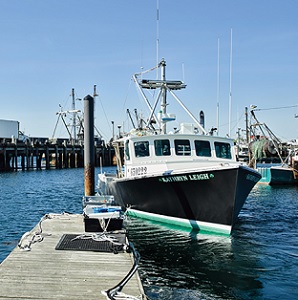
How Coronavirus Has Changed Business for Gloucester Fishermen
Gloucester has been a fishing town since its founding in the early 1620s, and the industry was the backbone of the local economy well into the 20th century. In recent decades, however, the industry has struggled as it grapples with regulations designed to prevent over-fishing and limit environmental damages. Many fishermen with long family histories in the business have had to turn to new professions, and the city’s fishing fleet has declined significantly since its peak. When the COVID-19 pandemic emerged, the situation became even worse. Government mandates and public health recommendations closed the doors of many restaurants, where the vast majority of the seafood consumed in the United States is eaten. In 2017, about 68 percent of the money Americans spent on seafood—some $70 billion—was at restaurants, according to a report from the National Oceanic and Atmospheric Administration. >click to read< 10:11
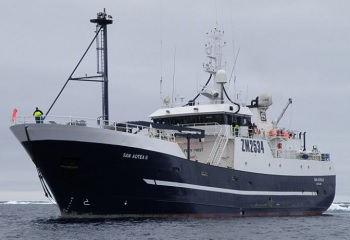
F/V San Aspiring crew back from Falklands ahead of schedule aboard F/V San Aotea II
The mission to retrieve 15 Kiwi fishermen from the South Atlantic Ocean is almost at an end, with the F/V San Aotea II anchoring off the coast of Timaru, in New Zealand’s southern island, a day ahead of schedule. According to reports in the NZ media, the long liner was expected to arrive in Timaru on August 1 after a 55-day round trip, but arrived on Friday morning, ahead of schedule thanks to unusually good weather in the South Pacific in the past week, Sanford spokesperson Fiona MacMillan said. >click to read< 13:10
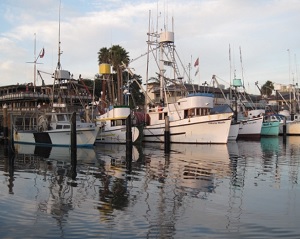
CARES Act: California Fisheries Relief Funding Soon to be Available for Select Sectors Affected by Coronavirus
Coastal and marine fishery participants – including licensed commercial fishermen, fish buyers, aquaculture businesses, charter boat owners and guides – who have experienced a loss of income due to the effects of COVID-19 may be eligible for federal relief funding disbursed through the California Department of Fish and Wildlife (CDFW). The funding is part of the federal Coronavirus Aid, Relief and Economic Security (CARES) Act. This more than $2 trillion economic relief package provides direct economic assistance for American workers, families and small businesses that have been impacted COVID-19. About $18 million in CARES funding was earmarked specifically for fisheries assistance in California. >click to read< 12:07
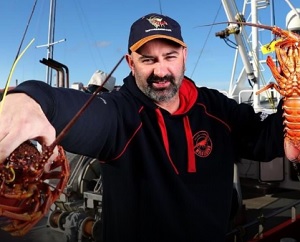
“Aussie Lobster Men”: Tasmania’s Aussie Lobster Man!
Brendan “Squizzy” Taylor and the boys portray the real lives of a crew on board a commercial fishing vessel here in Tassie. Filming was originally due to finish back in March, but like most things the pandemic hit and filming was delayed. The pandemic has transformed the lobster industry dramatically, Squizzy revealed the price of lobster had dropped significantly in the past few months. “This has been the most stressful time of my life in the family business. The industry got turned on its head overnight” At the height of the COVID-19 pandemic, the only place he was able to sell lobsters was straight off the boat in Margate to locals. >click to read< 11:09

A message from Chris Oliver on National-Level Observer Waiver Criteria; Redeployment in Northeast To Begin
To improve transparency in our approach to observer deployment, we have established national-level criteria for vessels to be waived (released) from observer or at-sea monitor coverage. Going forward, observer or monitor coverage may be waived, for both full and partial-coverage fisheries, on a trip-specific basis if one of the following two criteria are met: (1) Observers or at-sea monitors are not available for deployment; or (2) The observer providers cannot meet the safety protocols imposed by a state on commercial fishing crew or by the vessel or vessel company on its crew. Within our limited authority, our efforts are intended to ensure observers and monitors are following the same safety protocols that fishermen are following. >click to read< 17:50
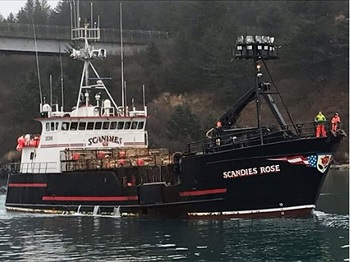
UPDATE: U.S. Coast Guard Marine Board of Investigation into loss of F/V Scandies Rose has postponed Pubic Hearing
The U.S. Coast Guard has postponed the public hearing, part of the larger investigation into circumstances surrounding the sinking of the commercial fishing vessel (F/V) Scandies Rose and the loss of five of its seven crewmembers. The hearing was scheduled to take place in Seattle September 8-18, 2020. The decision to delay the public hearing was made to protect the health of the investigative team, the witnesses, and families and to comply with federal and state travel restrictions to reduce the spread of COVID-19. “The public hearing is a critical part of the Marine Board of Investigation (MBI) process, one that requires transparency. Those affected by this tragedy have the right to attend in person and, if we can’t afford them that, we owe them an alternative means,” said Cmdr. Greg Callaghan, MBI Chair. >click to read< 13:57
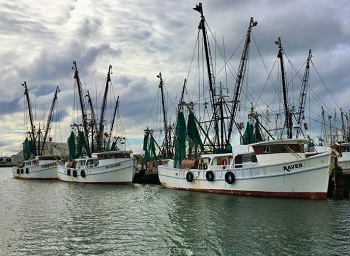
Florida fisheries wait for federal aid as prices take a deep dive – fisheries across the nation have experienced steep sales decline
Federal officials Wednesday defended the delay in releasing $300 million on fisheries assistance funding, including $23.4 million for Florida, saying the pandemic has set them behind in analyzing data to determine how much each fishery is due. Senators on the Commerce, Science, & Transportation Committee urged faster action to offset the impacts of COVID-19 on the seafood industry. Committee Chairman Sen. Roger Wicker, R-Miss., noted that fisheries across the nation have experienced up to a 90 percent decline in sales.,, In May, the CARES Act allocated $300 million for fisheries assistance funding. Florida received $23,447,815, according to the Atlantic States Marine Fisheries Commission. However, the National Oceanic and Atmospheric Administration has not approved the state’s plan. >click to read< 13:03
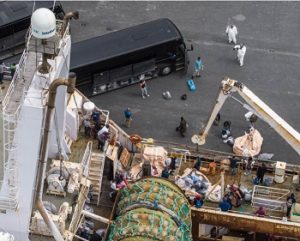
Trump admin Coronavirus task force urges Alaska to require masks for seafood plants and hot spots
The state should mandate masks, especially in seafood processing plants and places with high or rising case counts, to slow Alaska’s explosive coronavirus infection rates. That’s the recommendation of a July 26 report distributed to states by the Trump administration’s coronavirus task force,,, The update summarized the state’s largest COVID-19 outbreaks to date. The top four involve the seafood industry and together involve more than 350 people: 139 out of about 252 workers at the OBI Seafoods plant in Seward; 85 out of about 119 workers on the factory trawler American Triumph; 76 workers out of about 135 at the Copper River Seafoods plant in Anchorage; and 62 out of about 150 at the Alaska Glacier Seafoods plant in Juneau. >click to read< 09:49
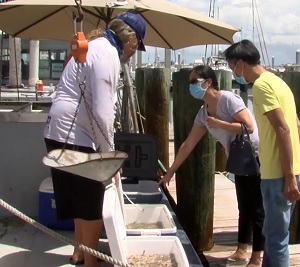
Despite the Coronavirus pandemic, bait shrimping business is good
Over the past few years, the shrimping business has been struggling. Even the number of boats licensed to catch bait shrimp in Texas bays has dropped. There are currently only about 300 boats licensed to catch bait shrimp in Texas bay waters compared to 2,378 in 1988. Just days after Hurricane Hanna slammed into the Coastal Bend, those few bait shrimping boats were back at work to meet the public demand. “They have been selling as fast as we can get them. It is gone. We are steady every day; every day we need 200 pounds every day,”, video, >click to read< 09:22
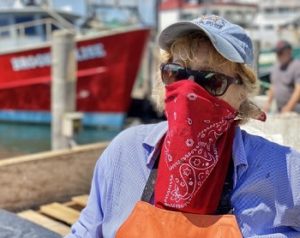
On the fishing docks of Point Judith: Sales are down, but they still work hard in the heat
She was surrounded by 450-pound barrels of the bottom fish, brought in by draggers. Despite wholesale lobster prices being down from the pandemic, boats are still going out to scratch out a paycheck. It’s all they have. Andrea was wearing orange oilers and rubber boots in the sun, driving a huge needle through four frisbee-size skates at a time to make a “string.” The bait not only lures lobsters but is good eating for them during the days they’re in traps before being hauled. Andrea joked that her skates are what makes lobsters taste good. I asked how old she is. She smiled and said, “None of your business,” then allowed she might be in her mid-60s. She’s a longtime fixture on the docks, having started “The Bait Company” there 36 years ago to serve the big boats that go out to sea. photos, >click to read< 22:15






